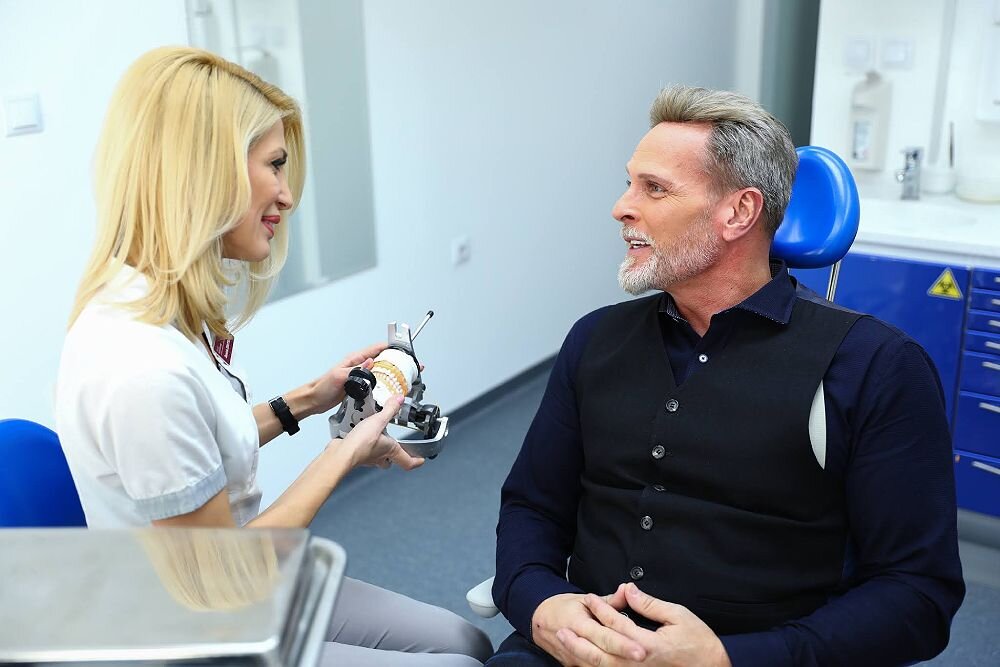For the most part, however, these worries are completely unfounded. Modern devices and good medication ensure that the patient typically has a pain-free experience, even during longer procedures.
Unfortunately, a patient’s anxiety is sometimes so severe that logical arguments do not help.
“We frequently see patients who have suffered very bad experiences and have not visited a dentist for years as a result,” explains Dr. Regina Schindjalova, director of the Dentaprime Clinic. However, this avoidance behaviour is counterproductive, since long periods without checkups or treatment frequently result in longer, more complex interventions than if the patient had visited the dentist earlier.
 “If the patient does not receive checkups or routine, minor treatments, it can rapidly become the case that the teeth must be extensively filed or even removed completely. This is a much more extensive procedure than would otherwise have been necessary,” says Dr. Schindjalova. But knowledge of this fact merely leads many sufferers into renewed cycles of avoidance – they refrain from seeking the help of a specialist, even if they’re suffering severe pain or discomfort.
“If the patient does not receive checkups or routine, minor treatments, it can rapidly become the case that the teeth must be extensively filed or even removed completely. This is a much more extensive procedure than would otherwise have been necessary,” says Dr. Schindjalova. But knowledge of this fact merely leads many sufferers into renewed cycles of avoidance – they refrain from seeking the help of a specialist, even if they’re suffering severe pain or discomfort.
So what to do you if you’re affected by dentophobia?
For some patients, a detailed consultation and explanation of the treatment is therapy enough. When they feel well provided for, can ask questions and perceive that the dentist has time for them, they approach the treatment more calmly.
“In our daily dealings with our patients, we’re careful to ensure that they’re well informed before undergoing treatment,” says Dr. Schindjalova. “Many people find it helpful to be able to prepare mentally for what’s coming. They diminish their anxiety by thinking directly about what to expect.”
Other patients want to know as little as possible, since extra information only increases their anxiety. “When we hold consultations with our patients, it’s important for us to find out exactly where their anxiety comes from,” continues Dr. Schindjalova. “Only then can we approach the patient and help them overcome their fears.”
While some clinics work with hypnosis, there are a number of other specialists to whom a patient can turn to help them prepare for treatment. Behavioural therapy is one such course of action, and is a fairly lengthy process. Over multiple sessions, the patient attempts to “unlearn” their learned, worry-prone behaviour. This treatment must be carried out by a behavioural therapy specialist – it cannot be provided by the dentist themselves.
 Yoga courses and autogenic training courses are also an option for patients wishing to tackle the problem through self-help. The guided breathing exercises and stress management techniques they learns can be employed when they are faced with the dentist’s chair.
Yoga courses and autogenic training courses are also an option for patients wishing to tackle the problem through self-help. The guided breathing exercises and stress management techniques they learns can be employed when they are faced with the dentist’s chair.
“A patient should always let their dentist know about their anxiety,” advises Dr. Schindjalova. “The dentist will then be aware of it and can respond accordingly during the procedure.”
A further option for tackling dentophobia is the use of anaesthetic. While many clinics use general anaesthesia, this option is not to be chosen lightly, since it’s associated with large amounts of stress on the body. An often preferable alternative is semi-conscious sedation, known in technical language as TIVA (total intravenous anaesthesia). It is just as effective as general anaesthesia, but with the major advantage that the strain placed on the patient’s body is greatly reduced. Rather than knocking the patient out, like general anaesthesia, it places the patient in a semi-conscious state. He or she feels nothing of the treatment, yet is able to react to instructions from the dentist without remembering them later.
“For our patients, this has proven the optimal way of enabling them to undergo treatment in a calm fashion,” says Dr. Schindjalova. “We have been using TIVA for a number of years and have so far received consistently positive feedback from our patients.”
But regardless of which aids you choose to fight your anxiety: it’s vital that you confront it head-on and undergo procedures as soon as they become necessary.


